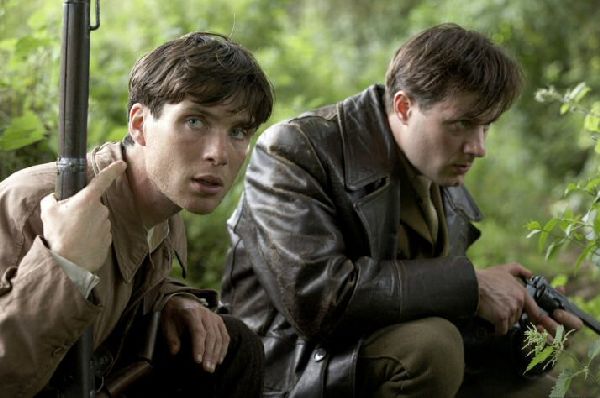The Wind That Shakes the Barley (2006) 

Director: Ken Loach
Cast: Cillian Murphy, Padraic Delaney, Liam Cunningham
Synopsis: A sympathetic look at Republicans in early 20th century Ireland, and two brothers who are torn apart by anti-Brit rebellion.
WARNING! This review contains SPOILERS!
You would have thought that Ken Loach’s pro-IRA saga would have courted controversy from the outset, but it was only after the film won the Palme d’or that it received widespread release. Had it not been as well-made as it undoubtedly is it would have promptly sunk without trace — in the UK at least. The reason for this is that, for a large proportion of the English population the ‘troubles’ in Ireland are only of interest when the IRA are busy blowing up our fellow countrymen. One day, perhaps, we’ll get to see a pro-IRA film that focuses on the organisation’s brave bombing campaigns on the mainland, or its financing of drug deals to buy weapons, and its’ heightened sense of civic duty that is so clearly evident in its’ practice of kneecapping joy-riders and petty thieves.
While Loach’s film is an intelligent and absorbing watch (that means slow to the Multiplex crowd), it falls victim to some clear deceit. It seems Loach feels he can only guarantee our sympathy for the Irish ‘freedom-fighters’ by portraying every English soldier — of whatever rank — as a psychopathic bully, incapable of stringing more than a few words together without SHOUTING VERY LOUDLY, swearing, and inflicting torture upon the doughty Irish folk who only want to play their football and drink their ale. It’s a bit like a throwback to those WWII action-propaganda films in which every Jap gets inordinate pleasure from inflicting pain on enemy soldiers and every Hun eats babies.
Luckily these village lads have a penchant for killing, and soon have the British army on its knees. It’s only at this point, when the Irish begin to enjoy the spoils of their success that the film really comes together as it focuses on the dissolution of ideals by power — however minimal — no matter where you come from. And it’s the less dramatic moments devoted to this point — such as the debate over an old lady’s unfair debt to an exploitative moneylender who also happens to finance the purchase of guns for the provos — that appear the most authentic and that are, without doubt, the most interesting. The more dramatic incidents — such as the execution of a childhood friend who has betrayed the fighters — while perhaps realistically handled in themselves, only serve to further blur the motivations of a character for who the killing marks the completion of a journey from one end of a spectrum (an oath to save lives) to the other.
Brothers Damien (Cillian Murphy) and Teddy (Padraic Delaney) follow opposing character arcs as the film progresses that, while convincing on screen, strain credibility upon later reflection, and indicate some of the melodramatic tendencies of the script. Ultimately, we are asked to sympathise with a character who suffers the same fate as the boy he executed simply because he is dying for a ‘noble’ cause and not for an action committed out of fear and, given all that’s gone before (and since in the real world) that’s not something that’s easy to do….
httpv://www.youtube.com/watch?v=xhn5_gUcO5E
